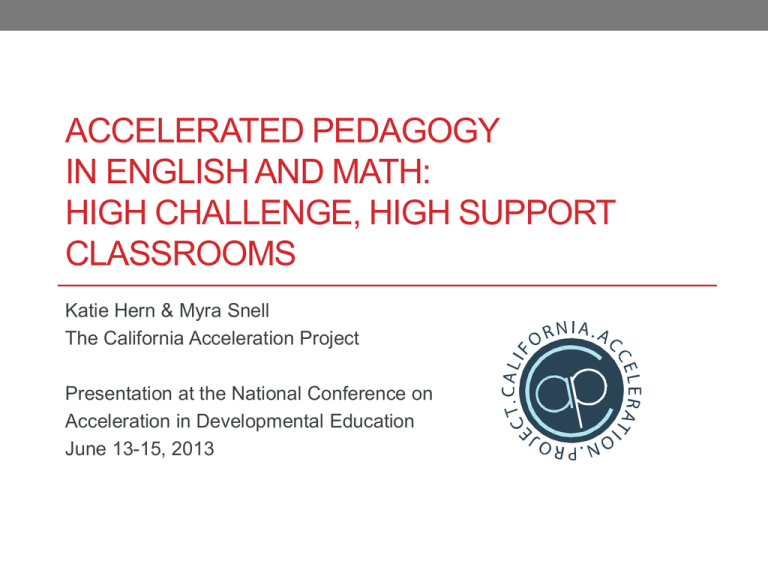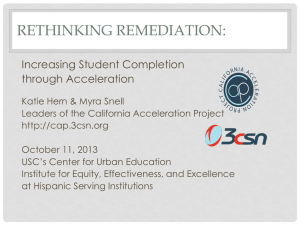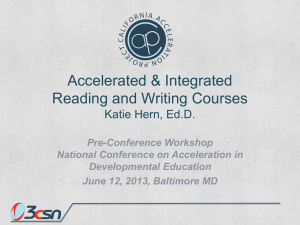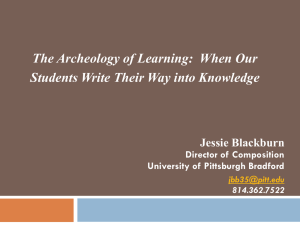PPTX
advertisement

ACCELERATED PEDAGOGY IN ENGLISH AND MATH: HIGH CHALLENGE, HIGH SUPPORT CLASSROOMS Katie Hern & Myra Snell The California Acceleration Project Presentation at the National Conference on Acceleration in Developmental Education June 13-15, 2013 CALIFORNIA ACCELERATION PROJECT http://cap.3csn.org Supporting California’s 112 Community Colleges To Redesign Developmental English and Math Curricula And Increase Student Completion An initiative of the California Community Colleges’ Success Network (3CSN), funded through the Basic Skills Initiative of the state Chancellor’s Office. Additional support from the Walter S. Johnson Foundation, LearningWorks, and “Scaling Innovation,” a project of the Community College Research Center funded by the William and Flora Hewlett Foundation Katie Hern, Director khern@chabotcollege.edu Myra Snell, Math Lead msnell@losmedanos.edu CAP Instructional Design Principles In the California Acceleration Project, we argue that colleges need to shorten and fundamentally redesign English and math curricula, guided by five core principles: • Backwards design from college-level courses • Relevant, thinking-oriented curriculum • Just-in-time remediation • Low-stakes, collaborative practice • Intentional support for students’ affective needs Backwards Design from College-Level Courses To be “ready” for a college-level course in English or math, students need practice and guidance in the same things that these courses require: • Reading/writing: Providing the same tasks students will see in college English, with more support • Math: Tailoring developmental coursework to the specific curricular pathway students will pursue (e.g. more extensive algebra for students pursuing Calculus-based majors, pre-statistics courses for other paths). Remediation addresses only topics that are relevant to success in their chosen pathway. Why Backwards Design in Math: Misalignment of Algebra sequence and Statistics Faculty Voices from CAP “I never ever want to introduce a topic by saying ‘I’m sorry, but we have to cover this. I know you will never use it again once you leave college,’ I don’t have to, when I teach prestatistics.” “With the right support, students are capable of doing great academic work! They don’t need to start with a simple paragraph. They can write complex essays from the start.” Relevant, Thinking-Oriented Curriculum Under-prepared students are best served by rigorous engagement with issues that matter – curricula that ask them to wrestle with open-ended problems and use resources from the class to reach their own conclusions. Our assignments should both invite – and help to develop – students’ sense of themselves as having something to contribute, a sense of their own agency. Faculty voices from CAP “In the non-accelerated classroom, I think I focused more on teaching students to eliminate the superficial errors, so students in that class ended up producing a ‘prettier’ assignment; however, their writing did not illustrate complexity of thought….This was partly due to the formulaic nature of the assignments I used to give (topic sentence should look like this and be placed here, supporting details should go here, etc.) and mostly due to the lack of opportunity for critical thinking in my previous assignments.” Just-in-Time Remediation Remediation takes place as-needed as students grapple with challenging college-level tasks. • Grammar guidance occurs in response to students writing as they learn to edit their own work. • A review of relevant arithmetic or algebra grows out of students analyzing data to answer an intellectually engaging question. Forensic analysis: Can we estimate height & weight from an ankle bone? Faculty Voices from CAP “I put students in groups and simply asked them to write an organizational outline for their next paper assignment….what points would they make, what evidence would they use, in what order would information be presented? I resisted ‘telling’ them how I wanted it done. I didn’t lecture or give any handouts other than the essay assignment….The biggest thing this has taught me is that I do not need to ‘teach’ everything. Working as a sounding board and questioning their choices is more productive than a lecture or a handout.” Intentional Support for Affective Needs Students are placed into remedial courses based upon tests of their math, grammar, and reading comprehension skills. But teachers often find that – while students’ skills may need work – the bigger issue is whether they come to class consistently, complete the assigned homework, show up for tests, and turn in their papers. How do we design our classes so that self-sabotaging behaviors don’t derail students? Faculty Voices from CAP “I kind of started getting into this mindset, Well, if they don’t care, I can’t make them care…I really just thought it was laziness. Now I realize…it’s just that students are intimidated. They don’t want to act like they care because then they would be failures if they didn’t succeed.” “I need to have a more ‘growth mindset’ about my students…. I need to realize that one low grade on a student paper does not mean that student cannot succeed or progress. This was a radical change for me.” Low-Stakes Collaborative Practice When teachers ask under-prepared students to do challenging, college-level assignments, they need to build in a lot of opportunities for practice. Students need space to grapple with ideas, try out new vocabulary, see how other students approach tasks, and receive targeted guidance from the teacher. Activities should: • Focus on meaningful high-priority skills that are well- aligned with graded assessments, • Require students to actively work with course concepts & materials in class. As they speak, write, or produce posters, the teacher sees what they understand and what needs clarification. Student Voices from CAP Describing her instructor’s approach to the accelerated prestatistics class: “It’s kind of like…You dig in and get your hands dirty, however you feel you need to, and I’m here for you to help clarify, to help understand, help get you along better. I like that. It’s more like the instructor is a facilitator, as opposed to, I’m spewing out all this information that I need you to regurgitate on an exam.” Hands-On Collaborative Practice Case Study: Accelerated Classroom Gone Awry Individual Reflection: Review the handout “Attending to the Affective Domain,” think about how these practices might be relevant: • Which practices might help prevent the situation? • Which practices might help improve it once underway? • Do you have other ideas for addressing the situation? Speed Dating: In rapidly rotating pairs, share your ideas about addressing/preventing the problems in this case. Further Discussion The principles in this presentation are described at length in a forthcoming publication from LearningWorks: • Hern, K., with Snell, M. (2013). Toward a Vision of Accelerated Curriculum and Pedagogy: High Challenge, High Support Classrooms for Underprepared Students. Oakland, CA: LearningWorks. Anticipated release: September 2013. Check the California Acceleration Project website for updates. http://cap.3csn.org







